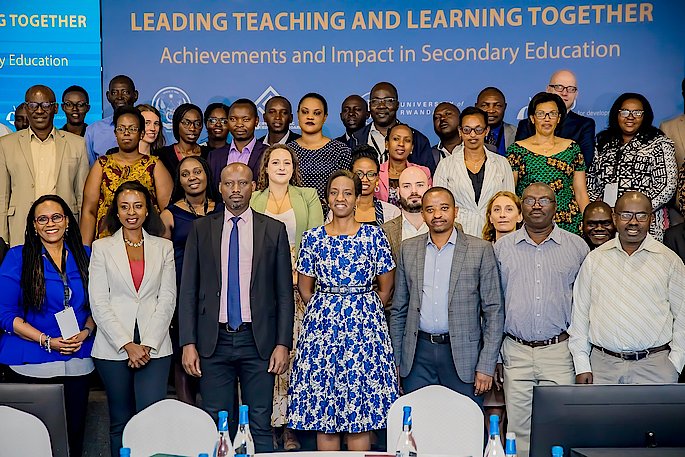
The Permanent Secretary of the Ministry of Education (MINEDUC), Charles Karakye, appreciated the results of “Leading, Learning and Teaching Together” program during the closing event to celebrate the achievement of this program after 4 years of implementation in 14 Districts of Rwanda whereby 700 schools were reached through the program.
The program was initiated by VVOB-Rwanda with the support of the Mastercard Foundation’s Leaders in Teaching Initiative, the Belgian Government (the Directorate General for Development Cooperation-DGD) and was implemented in partnership with the Rwanda Basic Education Board (REB) and the University of Rwanda College of Education (UR-CE) with the core aim of strengthening the competences of key actors in education through improved Continuous Professional Development (CPD) support systems.
Permanent Secretary Charles Karakye said that the Leading, Teaching and Learning Together program targets are in line with Education Sector Strategic Plan and recognized the role of development partners in education towards implementing education sector plans and priorities successfully.
“The purpose of the leading, Teaching and Learning Together (LTLT) program was to continue promoting the quality of basic education through enhancing school leadership and setting up an induction system for new teachers, focusing on advancing the implementation of the Competence Based Curriculum while supporting the improvement of students learning outcomes in STEM for girls. The Continuous Professional Development support to Heads of Schools and new teachers, the focus put on STEM and girls and others all respond to the Education Sector Strategic Plan and we are all convinced that the Ministry of Education cannot implement education sector plans and priorities successfully without intervention of its development partners”
“Much has been done and we are still at work. However, we need to join hands as education sector stakeholders to find more solutions to numerous challenges affecting the enhancement of quality of education”. He added.
The program’s long-term objective was to provide young Rwandans with the skills and competences they need to succeed in the 21st century. To achieve the goal mentioned above, key education actors were reached including Head teachers, Deputy Head teachers, School-based mentors, School subject leaders in science, technology, engineering, and mathematics (STEM), Sector education inspectors and District directors and officers of education.
As part of the intervention, a diploma program in Effective School Leadership has equipped head teachers and deputy head teachers with the competences to fulfil their roles as school leaders. Additionally, a certificate program in Educational Mentorship and Coaching was offered to school based mentors and school subject leaders in STEM to equip them with effective tools and skills to support teachers and school leaders through guiding and organising school-based CPD.
Also, a certificate program in Educational Mentorship and Coaching was offered to sector education inspectors to strengthen their competences to coach school leaders effectively, and to initiate and sustain professional learning communities of school leaders. Although teachers were not the primary beneficiaries of the program, they were reached through key education actors, and via communities of practice (CoPs), formal induction programs for new teachers, and coaching and mentoring. (End)
